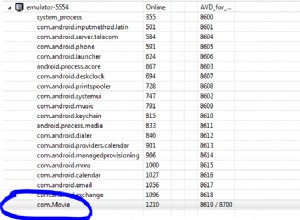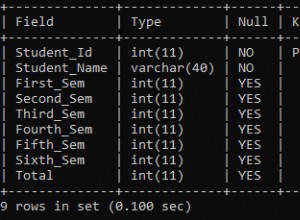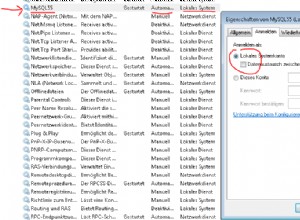Sie können eine gespeicherte Prozedur verwenden, wie Sie in Ihrer Frage erwähnt haben, da die Verschachtelung bis zu 7 Ebenen tief sein kann.
Gespeicherte Prozedur
CREATE PROCEDURE updatePath()
BEGIN
declare cnt, n int;
select count(*) into n from foo where parent_id is null;
update foo a, foo b set a.path = b.name where b.parent_id is null and a.parent_id = b.id;
select count(*) into cnt from foo where path is null;
while cnt > n do
update foo a, foo b set a.path = concat(b.path, '/', b.name) where b.path is not null and a.parent_id = b.id;
select count(*) into cnt from foo where path is null;
end while;
END//
Um den tatsächlichen Datensatz zu überprüfen, haben wir nur die einfachen Datensätze mit einem Nullwert in der Pfadspalte gedruckt
select * from foo
Ergebnisse :
| ID | NAME | PARENT_ID | PATH |
------------------------------------------
| 1 | root1 | (null) | (null) |
| 2 | child1 | 1 | (null) |
| 3 | subchild1 | 2 | (null) |
| 4 | child2 | 1 | (null) |
| 5 | child3 | 1 | (null) |
| 6 | subchild2 | 4 | (null) |
| 7 | subsubchild1 | 6 | (null) |
Aufruf der Prozedur :
call updatepath
Ergebnis nach Ausführung der Prozedur :
select * from foo
Ergebnisse :
| ID | NAME | PARENT_ID | PATH |
----------------------------------------------------------
| 1 | root1 | (null) | (null) |
| 2 | child1 | 1 | root1 |
| 3 | subchild1 | 2 | root1/child1 |
| 4 | child2 | 1 | root1 |
| 5 | child3 | 1 | root1 |
| 6 | subchild2 | 4 | root1/child2 |
| 7 | subsubchild1 | 6 | root1/child2/subchild2 |
SQLFIDDLE
Hoffe das hilft...




